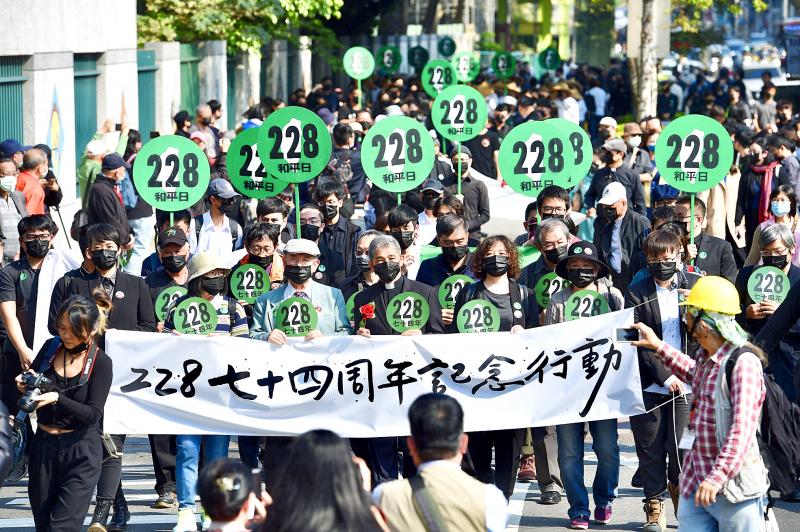More than 200 people yesterday marched in Taipei ahead of the 74th anniversary of the 228 Incident.
The incident refers to a crackdown by the then-Chinese Nationalist Party (KMT) regime against anti-government protests that began on Feb. 28, 1947, when security personnel at the Governor-General’s Office in Taipei — now the site of the Executive Yuan building — opened fire on civilian demonstrators who were demanding the arrest of those responsible for the killing of a bystander in an incident the previous day.
The bystander was part of a crowd that had gathered outside Taipei’s Tianma Tea House (天馬茶房) on Nanjing W Road to challenge Tobacco Monopoly Bureau officials after one of them struck Lin Chiang-mai (林江邁), a woman selling cigarettes illegally.

Photo: Peter Lo, Taipei Times
The incident was followed by the imposition of martial law, which lasted from May 19, 1949, to July 15, 1987, during which political dissidents were suppressed and many were killed.
Yesterday’s rally was the fifth in a series of annual demonstrations first organized in 2017 by the Tsai Jui-yueh Dance Research Institute and the Nylon Cheng Liberty Foundation and Memorial Museum.
The demonstrations are aimed at reminding the government of its “historical duty,” organizers said.
This year’s event was led by the Provisional Office of the Formosa Youth Council and the National Taiwan University Written Taiwanese Society, with “Burying Authoritarianism” and “Making Formosa” the central themes, they said.
Dozens of groups, including the Taiwan Association for Human Rights, Covenants Watch and the 228 Memorial Foundation, were represented at the march, they added.
The marchers, most of whom were dressed in black, gathered outside Rixin Elementary School in Datong District (大同) at about 1:30pm, before starting their march after 2pm.
They walked past the Tianma Tea House, the Taipei branch of the Tobacco Monopoly Bureau and the former site of the Taiwan Broadcasting Station, before stopping at the Executive Yuan.
The purpose of “remembering the past is to move toward a better future,” Nylon Cheng Liberty Foundation and Memorial Museum director Cheng Chu-mei (鄭竹梅) said before the march began.
She urged people to think about the kind of country they wanted, adding: “We should continue to speak while we still can.”
The names of people who died during the 228 Incident were also read aloud during the march.
Pointing out that yesterday’s demonstration coincided with International Mother Language Day, National Taiwan University Written Taiwanese Society president Lim Jiu Sin (林柔辰) said that in addition to lives, language and culture were also taken.
“I hope that everyone can get our mother language back together,” she said in Hoklo (commonly known as Taiwanese).

Chinese spouse and influencer Guan Guan’s (關關) residency permit has been revoked for repeatedly posting pro-China videos that threaten national security, the National Immigration Agency confirmed today. Guan Guan has said many controversial statements in her videos posted to Douyin (抖音), including “the red flag will soon be painted all over Taiwan” and “Taiwan is an inseparable part of China,” and expressing hope for expedited reunification. The agency last year received multiple reports alleging that Guan Guan had advocated for armed reunification. After verifying the reports, the agency last month issued a notice requiring her to appear and explain her actions. Guan

The Kaohsiung Tourism Bureau audited six hotels in an effort to prevent price gouging ahead of Korean band BTS’ concert tour in the city scheduled for Nov. 19, 21 and 22 this year. The bureau on Friday said that the audits — conducted in response to allegations of unfair pricing posted on social media — found no wrongdoing. These establishments included the local branches of Chateau de Chine, Hotel Nikko, My Humble House, and Grand Hai Lai, it said, adding that the Consumer Protection Commission would have penalized price gougers had the accusations been substantiated. The bureau said the Tourism Development Act

GIVE AND TAKE: Blood demand continues to rise each year, while fewer young donors are available due to the nation’s falling birthrate, a doctor said Blood donors can redeem points earned from donations to obtain limited edition Formosan black bear travel mugs, the Kaohsiung Blood Center said yesterday, as it announced a goal of stocking 20,000 units of blood prior to the Lunar New Year. The last month of the lunar year is National Blood Donation Month, when local centers seek to stockpile blood for use during the Lunar New Year holiday. The blood demand in southern Taiwan — including Tainan and Kaohsiung, as well as Chiayi, Pingtung, Penghu and Taitung counties — is about 2,000 units per day, the center said. The donation campaign aims to boost

BACK TO WINTER: A strong continental cold air mass would move south on Tuesday next week, bringing colder temperatures to northern and central Taiwan A tropical depression east of the Philippines could soon be upgraded to be the first tropical storm of this year, the Central Weather Administration (CWA) said yesterday, adding that the next cold air mass is forecast to arrive on Monday next week. CWA forecaster Cheng Jie-ren (鄭傑仁) said the first tropical depression of this year is over waters east of the Philippines, about 1,867km southeast of Oluanpi (鵝鑾鼻), and could strengthen into Tropical Storm Nokaen by early today. The system is moving slowly from northwest to north, and is expected to remain east of the Philippines with little chance of affecting Taiwan,